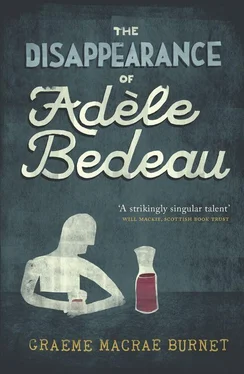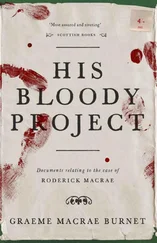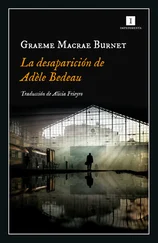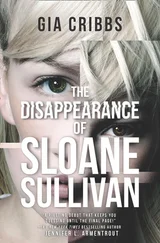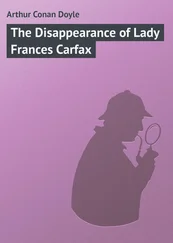He went into the kitchen and opened the doors of the cabinets. There were a few mismatched items of crockery, glasses, some tinned food. The fridge was empty, save for some fruit yoghurts in plastic containers, a pat of butter and a jar of strawberry preserve. On the worktop there was a packet of loose tea and a wooden board with a half-eaten loaf in brown paper bag from a nearby bakery. Gorski picked up the bag of tea and smelt it. There was a single cup and a side plate with a few crumbs, unwashed in the sink. Gorski did not read much into the lack of comestibles. Most likely Adèle took most of her meals at the Restaurant de la Cloche. He flicked open his notebook and found the name of the landlady, before stepping back into the sitting room.
The room was furnished with a sofa-bed that had been neatly stored away, an ugly glass-topped coffee table, a small chest of drawers and an old-fashioned wardrobe, too large for the room, which Gorski imagined was a hand-me-down from the landlady’s house.
‘There’s no need for you to stay, Mme Huber,’ he said.
The landlady did not appear to understand that he wished her to leave.
‘When will I be able to move her things out?’ she said. ‘I can’t afford to let the place go unlet.’
The girl had been gone for a matter of thirty-six hours. Gorski stared at her.
‘There’s no reason to believe that your tenant will not return,’ he said. ‘However, for the time being, the apartment is under police jurisdiction.’
He deliberately avoided using the term ‘crime scene’. People tended to get over-excited when they heard this phrase. And in any case, the apartment was not technically the scene of any crime.
Mme Huber looked at him sceptically. ‘What about the rent?’
‘I assume you’ve have been paid till the end of the month.’
She nodded grudgingly.
‘That’s three weeks away,’ said Gorski. ‘Let’s assume for the time being that the matter will be sorted out by then.’
The woman shrugged. Gorski asked her for the key and she handed it over without a word, before allowing him to usher her out of the apartment. When she was gone, he sat down on the sofa and lit a cigarette. He looked around the room for some sign of Adèle Bedeau. There were no pictures on the wall, no photographs on the bedside table, no books or magazines. Adèle had lived there for almost a year and seemingly done nothing to make the space more homely. Aside from the mismatched furniture, he might have been in a hotel room. Gorski got up and went to the window. He raised the blind to reveal an aspect of wasteland and the back of the breaker’s yard on Rue de la Paix.
Gorski made a cursory examination of the wardrobe and chest of drawers. He had no wish to fumble through the girl’s underwear or other garments and, even alone, he felt embarrassed doing so. There was nothing to suggest a hasty departure, nothing that suggested the absence of things. It was something his mentor, Ribéry, had taught him — not just to look at what was there, but to look for things that should have been there but weren’t. Adèle’s toothbrush was in the bathroom, along with other bottles and potions Gorski was familiar with from his own wife and daughter. On top of the wardrobe was a battered suitcase. Gorski lifted it down and placed it on the coffee table. It was dusty. It was the sort of place where a girl might keep her private bits and pieces. He flicked open the brass clasps. The case was empty. Adèle, it seemed, was a girl with no secrets. He put the suitcase back in its place. In the bedside table drawer, he found a half-finished tab of contraceptive pills. That was something. The last pill that had been taken was Thursday’s, suggesting that she had not returned home since then. Of course, it was possible Adèle was the absent-minded type, but if she had chosen to disappear, she had certainly not done so in a premeditated manner.
Afterwards, Gorski knocked on the doors of the neighbouring apartments. No one had ever done more than greet Adèle in passing. They had never seen her bring anyone back to the apartment or heard voices from inside.
‘Is she in some sort of trouble?’ a grey-haired woman, two doors along the landing, had asked.
People often asked this, their glee poorly disguised as concern. Gorski had no doubt the old woman would be quite delighted to be told that her neighbour had been brutally raped and done to death.
Gorski’s train of thought was interrupted by Yves taking a fresh glass of wine to the man in the shabby suit. The workmen who had been standing by the bar had gone, but he had not even noticed them leave. Perhaps it was not so unlikely that Manfred Baumann had seen nothing on the night of Adèle’s disappearance.
As Yves placed the glass on the man’s table, he looked up from his newspaper and caught Gorski’s eye. He pretended that it had not happened and immediately lowered his gaze. Gorski remembered him. He was a schoolteacher who had left the profession after a male pupil made some unsavoury allegations. Gorski had conducted a cursory investigation, but the pupil’s claims had proved malicious. Nevertheless, as happens in such cases, a cloud hangs over the accused and the man resigned his position. Gorski would have liked to convey with a cordial look that he did not regard him as guilty, but the former teacher had not given him the opportunity to do so. Most likely, the man did not wish to be reminded of an unpleasant episode in his past.
Gorski ordered a second beer. Yves brought it over and wordlessly removed his paper plate and napkin. The man finished his drink and left without looking in Gorski’s direction. Now that the bar was empty, Gorski felt vaguely ridiculous. The proprietor studiedly busied himself polishing glasses and wiping down the surfaces behind the bar. There was a telephone on the wall next to the door to the WC. Gorski thought of phoning the station to check on the progress of the investigation, but it would be impossible to do so without being overheard. There was nothing else for it but to return to the station. He drank his beer, paid at the counter and left.
He passed the rest of the afternoon in his office, typing a report on the investigation for the examining magistrate. Why, even in this official document, did he feel the need to present matters in a positive light? The men he had despatched to question residents in the area about further sightings of Adèle or the young man on the scooter, had not turned up anything. It was frustrating. Having dismissed the idea that the waitress had disappeared of her own accord, Gorski was left with three further possibilities: she had met with an accident, committed suicide, or she had been murdered. The first of these could also be dismissed. Nobody answering Adèle’s description had been admitted to a hospital in the vicinity of Saint-Louis and if she had met with a fatal accident, her body would have been discovered by this time. Suicide could not be entirely dismissed. Had she thrown herself into the Rhine — the preferred method of suicide in the area — it was possible that her body would not be recovered for days or even weeks. However, nothing in her behaviour leading up to her disappearance suggested that she intended to do away with herself. Which left homicide, but without a body there could be no murder investigation. It was all speculation and Gorski did not like speculation. He liked to proceed with solid, logical steps built on concrete evidence. In his twenty or so years as a detective he had trained himself to extend the same attention to whatever scraps of information were connected to a case, no matter how insignificant they might appear. His credo was to eliminate intuition, what his colleagues liked to call ‘hunches’. And for the time being there was only one lead, the boy on a scooter. Until the young man was identified or Adèle’s body was discovered, there was little chance of progressing the investigation. Already, Gorski had the familiar sinking feeling in his stomach that the case was going cold.
Читать дальше
